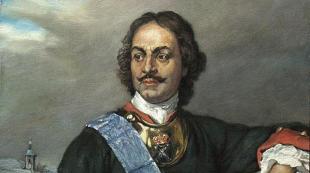Reader on developmental pedagogical psychology. Anthology on developmental psychology. Tutorial. Section I mental development
To paraphrase Montaigne, we can say that in this book I only made a bouquet of other people's flowers, and mine here is just a ribbon that ties them.
Developmental psychology and developmental psychology helped me choose the “color” for this ribbon.
Naturally, the work does not equally reflect all the problems, since I used the author's right to choose from the boundless sea of psychological information what I myself considered the most significant and interesting for my potential readers.
How is a practical reader built?
The workshop is intended for specialists working with the concept of the norm of mental development, and for students studying this concept.
A specialist who uses this concept - a teacher, a doctor, a lawyer, a psychologist, a social worker - solves the problems of a particular person. These can be the tasks of setting or clarifying a diagnosis, the tasks of determining the level of readiness of a person for some type of activity (educational, professional, family life, etc.).
The “norm of mental development” is a way of thinking of a researcher or practice about the individual life of a particular person, about the patterns of this life.
This concept itself is based on the concept of life, which is implicit in the way of thinking of any researcher or practitioner. In order for the concept of "norm of mental development" to acquire the content of the concept, and not remain an empty phrase (simulacrum), the researcher must master the phenomenology of mental development. This can be achieved by mastering the existing in psychology methods of analyzing the integrative characteristics of mental reality, which have the most important property, namely, the ability to generate new qualities in it.
The workshop is designed in such a way that in the course of work on assignments and when performing experiments, the reader has the opportunity to "see" the integrative qualities of mental reality. This skill allows you to make more informed decisions about how to obtain psychological information and its content when solving specific problems of a particular person.
It is for this purpose that the selection of scientific texts was carried out, which are presented as an introduction to each chapter. Texts are given in the form of summaries-retellings or as quotations from author's works. One of the tasks is to acquaint the reader with textbook texts in the field of developmental psychology in order to understand modern problems of both scientific, academic and practical psychology.
The most important goal of the workshop-reader is to show the reader the possibilities of methodically solving the issue of the level and norm of the mental development of a particular person.
From the very first pages, I would like to draw the reader's attention to the fact that the personal significance of solving the issue of compliance or non-compliance with a certain norm increases dramatically for a person in those situations where decisions are made responsible for his life. For example, about readiness for some type of activity, about peer review his activities, about the ability of a person to answer for himself.
In modern conditions, when the work of people evaluating the "normative" indicators of the human psyche is becoming increasingly important, their theoretical and methodological level becomes not only a personal matter of professional maturity, but also a socially significant phenomenon - the concretization of the value of various properties of mental reality.
For example, one of the first indicators of a child's readiness for school is the nature of the "internal position of the student." A favorable version of the “internal position” is associated with the orientation of the child to the content aspects of school life: he wants to study (or is studying), because he needs to read, write well, etc. In the statements of these children there is an orientation towards self-education (“I will be able, know, I can and etc.). The unfavorable version of the “internal position of a student” is associated with an orientation towards the formal aspects of school life: he wants to study because they will buy (have) a briefcase, a pencil case; you don’t have to sleep at school, like in kindergarten, etc.
The "internal position of a schoolchild" is one of the integrative characteristics of a child at primary school age, it reflects the qualitative changes in his relationship with other people and with himself. This is due to the emergence of a new form of generalization of one's place among other people. Such integrative formations in the mental reality of a person have been identified and studied to date enough to talk about the existence of prognostic psychodiagnostics and reasonable corrective (if necessary) work of an adult with a child or a mature person with himself (or together with a specialist) to change the parameters of mental reality .
Main questions - what, how and why study to characterize the mental reality of a person - and are discussed in this workshop.
The reader can complete tasks, reproduce classical experiments, compare his data with already known patterns. Perhaps he will have conditions in order to trace the features of changes in the identified characteristics of his subjects over a long time and thereby assess the accuracy of psychological forecasts.
The material presented in the text will allow students studying psychology as a specialty,
know: the main methodological principles of modern developmental psychology, the content of the scientific concept of the norm of mental development;
be able to analyze the content of the concept of the norm of mental development and fix the facts of its manifestation in the mental reality of a person by various methods;
own: psychodiagnostic methods and methods for creating batteries of methods for studying the indicators of normal mental development of a person from the standpoint of the cultural and historical theory of L. S. Vygotsky.
Chapter 1. About what developmental psychology is and why you need to know it
1.1. The concept of the subject of developmental psychology
Today, as I write this chapter, developmental psychology often appears in the list of psychology specialties instead of developmental psychology. This does not at all mean that the reality studied by developmental psychology has disappeared. Just by changing the name, it has become more definite: the subject of research is the indicators and patterns of human mental development in it.
It is they who determine the range of problems that distinguish this sphere of knowledge about a person from the entire volume of various information that has been accumulated in culture about a person and his life.
The specificity of this knowledge is that it is used in one form or another (scientific or everyday) by every person and in this sense is universal, universal knowledge.
Scientific knowledge about the patterns of human mental development becomes when the person receiving it takes a research position - the position of a scientist. The essence of this position is that a person is aware of his own thinking as a means and a way of obtaining psychological information, as a means and a way of generalizing it to obtain patterns and formulate laws.
The research position allows a person to solve the problem of the dependence of the content of the information received on his own thinking. This creates the necessary prerequisites for discussing the criteria for the truth of psychological knowledge, for example, through its universal recognition in science, etc.
The existence of different research schools in science, their historical continuity is possible because they are engaged in the study of the same subject. Today this subject could be described as a psychic reality. Its existence is associated with the presence of such properties and qualities that other realities do not have - physical, chemical, historical, etc. Suffice it to say that even time in this reality is not identical to physical. It is so individual that one and the same physical minute for one person may seem like an eternity, and for another it can go completely unnoticed.
Anthology on developmental psychology. Comp. Semenyuk. Ed. Feldstein. Ed. 2nd
The reader has been compiled in relation to
developmental psychology course. Texts
are excerpts and extracts from
works of leading domestic psychologists. Book-
ha is equipped with a scientific reference apparatus.
This book is a textbook for
course of developmental psychology for students studying
students of this branch of psychological science in the universities of Russia.
The main purpose of the allowance is to help students
there in mastering the main positions of the domestic
psychology in its specific area, in disclosing the content
zhania, meaning, structure of the process and patterns of mental development.
Particular attention in the anthology is given to the presentation
leading principles of approach to explanation and understanding
development of mental development, the formation of a growing person as a person.
We are talking, firstly, about the socio-historical sub-
progress towards understanding the nature of the human psyche;
secondly, about the patterns of development of activities
sti as the basis and mechanism of personal development;
thirdly, about the scientific periodization of mental development;
fourthly, about the characteristics of individual age-
periods that differ not in a simple set
various psychological characteristics, and special
personality structure, specific development trends.
This led to the choice of texts.
The anthology includes works of domestic psycho-
chologists, reflecting not only the main problem
ku developmental psychology, but also its most important concepts
tions, theoretical positions and experimental setups.
The selected texts give a fairly complete and con-
cretized idea of the scientific position of the
tors developing one or another aspect - age -
psychology and at the same time characterize the important
important role and its special place in the system of world psychological science.
The subject of special consideration in the reader-
ti began work that has an effective character, growing
covering conditions and mechanisms for activating pro-
the process of mental development of children as separate
age periods, and throughout the distance of modern childhood.
All texts included in the anthology are published by
with abbreviations. At the same time, giving fragments of
bot, we tried not to break their common logic,
leaving in the texts all the most important, necessary
to master the corresponding section of the curriculum
FOREWORD.................. 3
SECTION I. MENTAL DEVELOPMENT
A. N. Leontiev. On the theory of the development of the child's psyche... 5
M. Ya. Basov. The problem of human development .............. 8
V. M. Bekhterev, N. M. Shchelovanov. To substantiate the gene-
reflexology .............................................. 17
G. S. Kostyuk. The principle of development in psychology ........ 19
A. V. Zaporozhets. Conditions and driving causes of mental
child's development ............................... 23
L. S. Vygotsky. Imagination and its development in childhood
age ................................................ 26
N. S. Leites. Age prerequisites for mental
properties.................................................. 32
B. M. Teploe. Abilities and talents ............... 42
A. N. Leontiev. About the formation of abilities ......... 46
S. L. Rubinshtein. Ability problem and questions
psychological theory .............................. 56
SECTION II. PATTERNS OF PERSONAL DEVELOPMENT
A. N. Leontiev. Individual and Personality ................. 71
B. G. Ananiev. Genetic and structural relationships
in personal development .............................................. 77
A. V. Zaporozhets. The importance of early childhood for
the formation of a child's personality ....................... 84
L. I. BOZOVICH Stages of personality formation in onto-
genesis .................................................. 87
S. L. Rubinshtein. Orientation of personality ........... 98
I. S. Kon. Personality constancy: myth or reality?...101
SECTION III. DEVELOPMENT OF ACTIVITY AS THE BASIS OF MENTAL DEVELOPMENT AND PERSONAL DEVELOPMENT
A. N. Leontiev. General concept of activity ......... 112
D. I. Feldshtein. Patterns of development of activities
sti as the basis of personality development .............................. 121
M. I. Lisina. Communication with adults in children of the first
seven years of life...................................... 136
D. B. Elkonin. Basic unit of expanded form
gaming activity. The social nature of role-playing
games................................................. 143
A. R. Luria, F. Ya. Yudovich. Game Structure Changes
in connection with the development of speech .............................. 148
L. B. Itelson. Educational activity. her sources,
structure and conditions .............................. 152
D. B. Elkonin. Psychological issues of formation
educational activities in primary school age ...... 158
V.V. Davydov. Psychological problems of the learning process
teachings of younger students .............................. 160
D. I. Feldshtein. Features of leading activities
adolescents ........................................ 163
SECTION IV. PERIODIZATION OF MENTAL DEVELOPMENT AND FORMATION OF PERSONALITY
D. B. Elkonin. K. the problem of periodization of the mental
development in childhood .............................. 169
D. I. Feldshtein. Regularities of level-by-level development
personality development in ontogeny .............................. 176
SECTION V. MENTAL DEVELOPMENT AND PERSONAL FORMATION AT DIFFERENT STAGES OF ONTOGENESIS
L. I. Bozhovich, L. S. Slavina. Transition period from
infancy to early age .............................. 190
M. I. Lisina. Stages of the genesis of speech as a means of
................................................. .195
A. A. Lyublinskaya. Activity and orientation to-
schoolchild ............................................... 216
V. A. Krutetsky. Psychological features of the younger
schoolchild ............................................... 229
L. S. Vygotsky. The dynamics and structure of personality under-
sprout ................................................. 232
T. V. Dragunova. "Crisis" was explained in different ways.......... 237
I. S. Kon, D. I. Feldshtein. Adolescence as a stage of life
nor some psychological and pedagogical characteristics
transitional age sticks .............................. 239
D. I. Feldshtein. Features of the stages of personal development
Stories on the example of adolescence .............................. 248
I. S. Kon. Psychology of a high school student .............. 259
A. V. Mudrik. Modern high school student .............. 266
B. G. Ananiev. The structure of the development of psychophysiological
functions of an adult .............................. 275
E. F. Rybalko. Dynamics of the main characteristics of a person
century in different periods of its maturity .................. 283
- Leontiev A. N. On the theory of development of the child's psyche / Leontiev A. N. - 5-8
- Basov M. Ya. The problem of human development / Basov M. Ya. - 8-19
- Bekhterev V. M. To the substantiation of genetic reflexology / Bekhterev V. M., Shchelovanov N. M. - 19-20
- Kostyuk G. S. The principle of development in psychology / Kostyuk G. S. - 21-25
- Feldstein D. I. Childhood as a socio-psychological phenomenon of society and a special state of development / Feldstein D. I. - 25-53
- Zaporozhets A. V. Conditions and driving causes of mental development of the child / Zaporozhets A. V. - 53-57
- Vygotsky L. S. Imagination and its development in childhood / Vygotsky L. S. - 57-64
- Leites N. S. Age prerequisites for mental abilities / Leites N. S. - 64-75
- Teplov B. M. Abilities and talents / Teplov B. M. - 75-80
- Leontiev A. N. On the formation of abilities / Leontiev A. N. - 80-91
- Rubinshtein S. L. The problem of abilities and questions of psychological theory / Rubinshtein S. L. - 91-107
- Leontiev A. N. Individual and personality / Leontiev A. N. - 108-114
- Ananiev B. G. Genetic and structural relationships in the development of personality / Ananiev B. G. - 115-122
- Feldstein D. I. Socialization and individualization - the content of the process of social maturation / Feldstein D. I. - 123-135
- Zaporozhets A. V. Significance of the early periods of childhood for the formation of a child's personality / Zaporozhets A. V. - 135-138
- Bozhovich L. I. Stages of personality formation in ontogenesis / Bozhovich L. I. - 138-151
- Rubinshtein S. L. Orientation of personality / Rubinshtein S. L. - 151-155
- Kon I. S. Constancy of personality: myth or reality / Kon I. S. - 155-166
- Leontiev A. N. General concept of activity / Leontiev A. N. - 167-178
- Feldstein D. I. Patterns of development of activity as the basis for the development of personality / Feldstein D. I. - 178-194
- Lisina M. I. Communication with adults in children of the first seven years of life / Lisina M. I. - 194-203
- Elkonin D. B. The main unit of the expanded form of gaming activity. The social nature of the role-playing game / Elkonin D. B. - 203-209
- Luria A. R. Changes in the structure of the game in connection with the development of speech / Luria A. R., Yudovich F. Ya. - 209-213
- Itelson L. B. Educational activity, its sources, structure and conditions / Itelson L. B. - 213-219
- Elkonin D. B. Psychological issues of the formation of educational activity in primary school age / Elkonin D. B. - 219-222
- Davydov V. V. Psychological problems of the process of teaching younger students / Davydov V. V. - 222-226
- Feldstein D. I. Features of the leading activity of adolescent children / Feldstein D. I. - 226-231
- Elkonin D. B. On the problem of periodization of mental development in childhood / Elkonin D. B. - 232-240
- Feldstein D. I. Stage characteristics of socialization - individualization and levels of personality formation / Feldstein D. I. - 240-277
- Bozhovich L. I. Transition period from infancy to early age / Bozhovich L. I., Slavina L. S. - 278-283
- Lisina M. I. Stages of the genesis of speech as a means of communication / Lisina M. I. - 283-307
- Lyublinskaya A. A. Activity and orientation of a preschooler / Lyublinskaya A. A. - 307-322
- Krutetsky V. A. Psychological characteristics of a younger student / Krutetsky V. A. - 322-325
- Vygotsky L. S. Dynamics and structure of the personality of a teenager / Vygotsky L. S. - 325-330
- Dragunova T.V. "The crisis was explained in different ways / Dragunova T.V. - 330-332
- Kon I. S. Adolescence as a stage of life and some psychological and pedagogical characteristics of transitional age / Kon I. S., Feldshtein D. I. - 333-342
- Feldstein D. I. Features of the stages of personality development on the example of adolescence / Feldstein D. I. - 343-355
- Kon I. S. Psychology of a high school student / Kon I. S. - 355-363
- Mudrik A. V. Modern high school student / Mudrik A. V. - 364-372
- Ananiev B. G. The structure of the development of psychophysiological functions of an adult / Ananiev B. G. - 373-382
- Rybalko E. F. Dynamics of the main characteristics of a person in different periods of his maturity / Rybalko E. F. - 382-396
Bibliography of the works of L. S. Vygotsky 1915 1. The tragedy of Hamlet, Prince of Denmark, W. Shakespeare // family archive L. S. Vygotsky. Gomel, August 5 - September 12, 1915 Manuscript. 1916 2. Literary notes. ... ... Wikipedia
This page is an information list. See also the main article: Vygotsky, Lev Semenovich Lev Semenovich Vygotsky (1896 1934) Soviet psychologist, founder of the cult ... Wikipedia
- (from digital index to bibliography) In this index, we present only those bibliographic sources that are used for extracts. After the name of the source, the year of writing the corresponding work is given in brackets (according to the "List of Works", ... ... Dictionary L.S. Vygotsky
- (1904, Kremenchug November 20, 1956, Kharkov) Soviet and Ukrainian psychologist, follower of Vygotsky and representative of the Kharkov school of psychology. Contents 1 Biography 2 Scientific contribution ... Wikipedia
Asnin, Vladimir Ilyich Asnin, Vladimir Ilyich (1904, Kremenchug November 20, 1956, Kharkov) Soviet and Ukrainian psychologist, follower of Vygotsky and representative of the Kharkov School of Psychology. Contents 1 Biography 2 Scientific contribution ... Wikipedia
Asnin, Vladimir Ilyich (1904, Kremenchug November 20, 1956, Kharkov) Soviet and Ukrainian psychologist, follower of Vygotsky and representative of the Kharkov School of Psychology. Contents 1 Biography 2 Scientific contribution 3 Bibliography ... Wikipedia
Vladimir Asnin- Vladimir Ilyich Asnin (Vladimir Ilyich Asnin) (1904 1956), Soviet developmental psychologist, a representative of Kharkov School of Psychology, head of the Department of psychology at the Kharkov State Pedagogical Institute in 1944 1950. In the ... ... Wikipedia
LAUDIS- Valentina Yakovlevna (b. 1932) Russian psychologist, specialist in educational psychology, developmental psychology, general and social psychology. Author of the concept of functional relationship of genetic forms of memory. Doctor of Psychological Sciences ... ... Encyclopedic Dictionary of Psychology and Pedagogy
AGE-RELATED PSYCHOLOGY- a branch of psychology that studies the development of the human psyche and its features in decomp. age stages. Includes child psychology, psychology of individual development of an adult and gerontopsychology (the psychology of old age). In children. psychology ... ... Russian Pedagogical Encyclopedia
The field of psychology that develops psychological foundations training and education. Like work psychology, engineering, military or clinical psychology, this area is sometimes referred to as applied branches of psychology, the purpose of which ... ... Collier Encyclopedia









